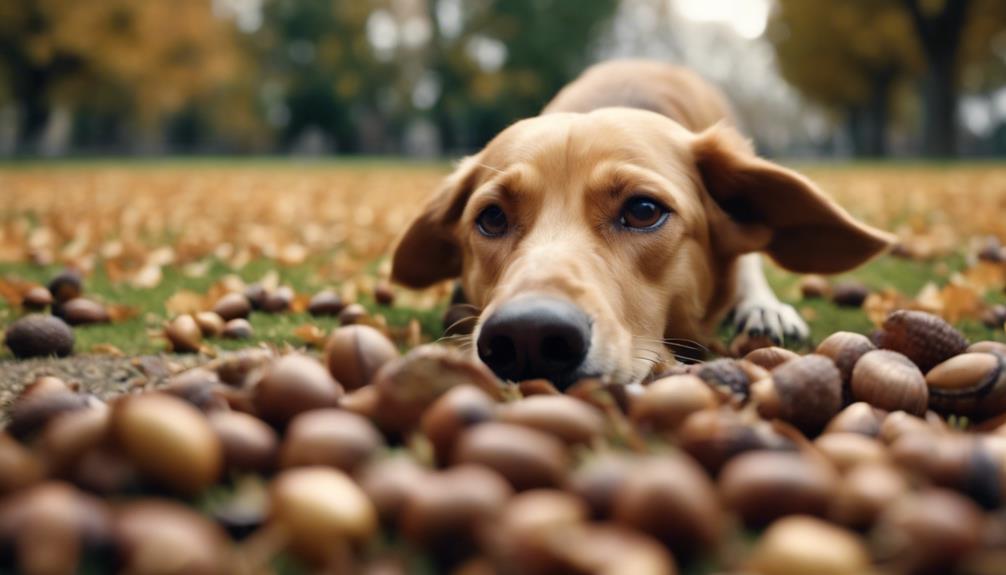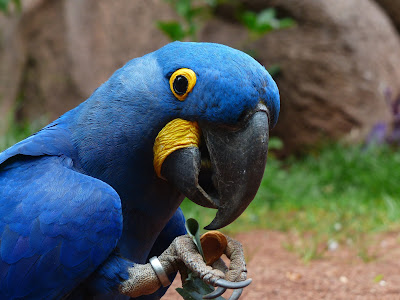Acorn Alert: The Dangers Of Dogs And Acorns

The Dangers Of Dogs And Acorns: Coincidentally, as you take your furry friend out for a walk this fall, have you considered the potential dangers lurking in the form of acorns? These seemingly harmless nuts can pose serious risks to your dog’s health. From choking hazards to toxic effects, acorns can lead to various complications if ingested by your canine companion. Stay tuned to learn more about the hidden dangers of dogs and acorns, and how you can safeguard your pet from these autumnal threats.
Acorns: A Potential Choking Hazard
Acorns pose a potential choking hazard for dogs, especially small breeds or those with a penchant for exploring the outdoors. These nuts, though seemingly innocuous, can become lodged in a dog’s throat, leading to choking. To prevent such incidents, it is crucial to implement choking prevention measures when your furry friend is around areas where acorns are present.
When engaging in outdoor activities with your dog, especially in areas where acorns are abundant, ensure that play is supervised. Keeping a watchful eye on your canine companion can help you intervene swiftly if they attempt to ingest an acorn. Supervised play allows you to redirect your dog’s attention away from these potential hazards, decreasing the risk of choking accidents.
Moreover, incorporating training commands like “leave it” can be beneficial. Teaching your dog to leave items they find on the ground can further reduce the chances of them picking up acorns. Consistent training and positive reinforcement can instill good habits in your dog, promoting safe behavior during outdoor excursions.
Toxic Effects of Ingesting Acorns
Ingesting acorns can lead to various toxic effects on your dog’s health, requiring prompt attention and care to mitigate potential harm. Acorn toxicity is a serious concern due to the presence of tannins, a substance toxic to dogs when consumed in large quantities. When your dog ingests acorns, they are at risk of experiencing gastrointestinal issues such as vomiting, diarrhea, and abdominal pain. These symptoms can range from mild discomfort to severe complications depending on the amount of acorns consumed and the size of your dog.
The ingestion risks associated with acorns extend beyond gastrointestinal problems. Acorns also pose a choking hazard or may cause intestinal blockages if large pieces are swallowed whole. These situations can be life-threatening and require immediate veterinary intervention. Additionally, acorns can lead to organ damage, especially to the kidneys and liver, if not addressed promptly.
If you suspect that your dog has ingested acorns or is showing any signs of acorn toxicity, it is crucial to seek veterinary help without delay. Your vet may recommend treatments such as inducing vomiting, administering activated charcoal to absorb toxins, or providing supportive care to alleviate symptoms. Remember, prevention is key – be vigilant when walking your dog in areas where acorns are present to avoid potential ingestion risks.
Symptoms of Acorn Poisoning in Dogs
If your dog shows symptoms of acorn poisoning, immediate veterinary attention is crucial to ensure their well-being and safety. Acorn toxicity can lead to various symptoms that signal a potential health risk for your furry friend. Here are some signs to watch out for:
- Vomiting: Your dog may start vomiting frequently, which could indicate an issue with their digestive system.
- Diarrhea: Loose stools or diarrhea may occur as the body tries to rid itself of the toxins ingested.
- Lethargy: Your dog may appear unusually tired or weak, lacking their usual energy levels.
- Loss of Appetite: A sudden disinterest in food can be a red flag that something is not right internally.
- Abdominal Pain: Your dog may show signs of discomfort in their abdominal area, such as whining or restlessness.
To prevent acorn poisoning, ensure that your dog is always supervised during outdoor activities to prevent them from ingesting acorns. If you suspect acorn poisoning or notice any of these symptoms, seek emergency care immediately. Treatment options for acorn poisoning may include inducing vomiting, administering activated charcoal to absorb toxins, intravenous fluids for hydration, and supportive care to manage symptoms. Remember, swift action is crucial in ensuring the well-being of your beloved pet.
Acorn-Related GI Issues in Dogs
Watching out for signs of gastrointestinal (GI) distress in your dog after exposure to acorns is crucial for their well-being. Acorns contain tannins and other compounds that can lead to acorn toxicity when ingested by dogs. If your furry friend shows symptoms like vomiting, diarrhea, abdominal pain, or reduced appetite after consuming acorns, it’s essential to take prompt action.
In cases of acorn ingestion, veterinary intervention is necessary to assess the severity of the situation. Your veterinarian may recommend treatments such as fluid therapy to prevent dehydration, anti-nausea medication, or other supportive care measures. It’s crucial not to delay seeking professional help if you suspect your dog has consumed acorns, as prompt treatment can make a significant difference in their recovery.
Additionally, dietary management plays a key role in helping your dog recover from acorn-related GI issues. Your vet may suggest a bland diet to soothe your dog’s stomach and promote healing. It’s important to follow their recommendations closely to ensure your pet’s digestive system can recover effectively.
Risks of Acorn Obstruction in Dogs
To safeguard your dog’s health, be mindful of the potential risks posed by acorn obstruction, a serious concern that can arise from dogs consuming these small nuts. Acorns are not only a choking hazard but can also lead to intestinal blockages, causing severe discomfort and even requiring surgical intervention. Here are some crucial points to consider:
- Dietary Management: Ensure your dog’s diet is well-balanced and nutritious to reduce the likelihood of them seeking out acorns as a source of nutrition.
- Behavioral Training: Train your dog to avoid picking up or eating objects from the ground, including acorns, through positive reinforcement techniques.
- Monitor Outdoor Activities: Keep a close eye on your dog while outdoors, especially in areas where acorns are abundant, to prevent them from ingesting these potentially harmful nuts.
- Regular Veterinary Check-ups: Schedule routine check-ups with your veterinarian to monitor your dog’s overall health and address any concerns regarding their diet or behavior.
- Prompt Action: If you suspect your dog has consumed acorns or is showing symptoms of distress such as vomiting, diarrhea, or lethargy, seek immediate veterinary care.
Preventing Acorn Ingestion by Dogs
To prevent dogs from ingesting acorns, ensure you thoroughly inspect your outdoor environment and promptly remove any fallen nuts from the vicinity. Acorn prevention starts with proactive measures such as keeping your yard clear of acorns to minimize the risk of ingestion. Training your dog to avoid picking up or eating acorns can also be beneficial in preventing potential health issues.
When engaging in outdoor play with your dog, it is crucial to maintain supervision to prevent them from scavenging and consuming acorns. Be vigilant during walks or visits to parks where acorns may be present on the ground. Encouraging play with safe, acorn-free toys can help distract your dog from foraging for nuts.
Incorporating obedience training into your dog’s routine can aid in reinforcing commands that discourage acorn consumption. Teaching commands like “leave it” or “drop it” can be valuable tools in preventing your dog from picking up acorns during walks or outdoor activities. Consistent training and positive reinforcement can help instill good behavior and reduce the risk of acorn ingestion.
Treatment Options for Acorn Poisoning
If your dog has ingested acorns and is showing symptoms of poisoning, it’s crucial to seek emergency care immediately. Veterinary treatment approaches for acorn poisoning may include inducing vomiting, administering activated charcoal, and providing supportive care. Remember, prompt action is key in ensuring the best possible outcome for your furry friend.
Emergency Care Options
In cases of acorn poisoning in dogs, immediate veterinary attention is crucial for effective treatment. If you suspect your dog has ingested acorns, here are some emergency care options to consider:
- Contact an emergency vet: Call the nearest emergency veterinary clinic for guidance.
- Do not induce vomiting: Contrary to some poisoning cases, with acorn ingestion, inducing vomiting is not recommended.
- Monitor for symptoms: Watch for signs of distress such as vomiting, diarrhea, lethargy, or abdominal pain.
- Provide supportive care: Keep your dog calm and comfortable while awaiting veterinary assistance.
- Avoid home remedies: Refrain from administering any home remedies without professional advice.
Seeking immediate help is crucial in cases of acorn poisoning to ensure the best outcome for your furry friend.
Veterinary Treatment Approaches
Consider consulting with a veterinary professional to explore appropriate treatment options for acorn poisoning in dogs. Nutritional management plays a crucial role in aiding recovery from acorn poisoning. Your veterinarian may recommend specific dietary changes or supplements to support your dog’s healing process. Recovery plans tailored to your dog’s individual needs will be essential for a successful outcome.
Additionally, behavioral modifications and environmental changes might be necessary to prevent future incidents of acorn ingestion. Your vet may suggest strategies to discourage your dog from eating acorns and ways to modify their environment to minimize access to these harmful nuts. By following the guidance of your veterinary professional and implementing the recommended treatment approaches, you can help your dog recover from acorn poisoning effectively.
When to Seek Veterinary Care
If your dog shows signs of illness after ingesting acorns, it’s essential to seek veterinary care immediately. Symptoms such as vomiting, diarrhea, lethargy, or difficulty breathing warrant urgent attention. Monitor your pet closely for any changes in behavior and act promptly to ensure their well-being.
Signs of Illness
Recognize the signs of illness in your dog that may indicate a need to seek veterinary care promptly. If you notice any of the following symptoms, it’s crucial to act swiftly to ensure your dog’s health and well-being:
- Lethargy: Unusual tiredness or lack of energy.
- Loss of Appetite: Refusal to eat or drink.
- Vomiting or Diarrhea: Persistent or severe gastrointestinal issues.
- Difficulty Breathing: Labored breathing or shortness of breath.
- Unexplained Pain: Whimpering, yelping, or signs of discomfort.
Monitoring your dog’s behavior and promptly identifying these symptoms can help in seeking the necessary treatment early, potentially preventing more severe issues. Trust your instincts and consult with a veterinarian if you have any concerns about your dog’s health.
Immediate Vet Attention
To ensure the well-being of your dog, promptly seek veterinary care if you observe any of the following concerning symptoms. If your dog displays signs such as persistent vomiting, diarrhea, lethargy, abdominal pain, loss of appetite, or difficulty breathing after ingesting acorns, it is crucial to act quickly. Immediate veterinary intervention is necessary to prevent further complications.
The emergency response provided by a veterinarian can include treatments to alleviate symptoms, prevent dehydration, and address any potential organ damage caused by acorn ingestion. Timely professional care significantly improves your dog’s chances of a successful recovery process. Remember, preventive measures such as keeping your dog away from areas with acorns can help avoid these worrisome situations. Your quick action can make a significant difference in your dog’s health and well-being.
Monitor Symptoms Closely
Closely monitor your dog’s symptoms for any concerning changes that may indicate the need for veterinary care. It’s crucial to be vigilant and seek guidance when necessary. Here are some signs to watch for:
- Decreased Appetite: If your dog suddenly loses interest in food, it could be a red flag.
- Lethargy: Unusual tiredness or reluctance to move may signal a problem.
- Vomiting or Diarrhea: Persistent vomiting or diarrhea could indicate an issue that needs attention.
- Difficulty Breathing: Any struggles with breathing should be taken seriously.
- Changes in Behavior: If your dog is acting differently than usual, it’s essential to pay close attention and consider consulting a vet.
Safely Enjoying Fall With Your Dog
As you enjoy the beautiful autumn season with your furry companion, it’s crucial to be mindful of potential hazards like acorns that could pose a danger to your dog’s health. While engaging in fall activities like hiking or playing in the leaves, remember to prioritize dog safety. Keep a close eye on your pup to ensure they don’t ingest acorns, which can lead to intestinal blockages or poisoning if consumed in large quantities.
To safely enjoy fall with your dog, consider the following tips:
- Acorn Awareness: Teach your dog the “leave it” command to prevent them from picking up acorns during your outdoor adventures. Regularly check your yard and walking paths for acorns to reduce the risk of exposure.
- Supervision: Always supervise your dog during outdoor activities to quickly intervene if they show interest in acorns. Redirect their attention to a safe toy or treat to discourage foraging.
- Nutritious Diet: Ensure your dog is on a well-balanced diet to support their immune system and overall health. A healthy diet can help mitigate the effects of accidental acorn ingestion.
- Veterinary Care: If you suspect your dog has consumed acorns or is showing symptoms of illness such as vomiting, diarrhea, or lethargy, promptly consult your veterinarian for guidance.
The Dangers Of Dogs And Acorns Frequently Asked Questions
Can Acorns Be Harmful to Other Pets Besides Dogs?
Yes, acorns can also be harmful to your cat’s health if ingested. Additionally, acorns can pose a risk to bird safety if they are consumed. Keep an eye out for any potential hazards in your pet’s environment.
Are Certain Types of Acorns More Toxic to Dogs Than Others?
Certain types of acorns can vary in toxicity levels for dogs. It’s crucial to be aware of acorn toxicity as it can impact your dog’s health. Stay vigilant and consult a vet if you suspect ingestion.
How Long Does It Typically Take for Symptoms of Acorn Poisoning to Appear in Dogs?
If your dog ingests acorns, symptoms of poisoning can appear within 6-12 hours. It’s crucial to seek emergency veterinary care immediately. Prompt treatment can help minimize the effects of acorn toxicity and ensure your pet’s well-being.
Can Acorn-Related GI Issues in Dogs Be Prevented With Dietary Changes?
To prevent acorn-related GI issues in your dog, consider making dietary modifications. Consult with your vet for tailored prevention strategies. Remember, a balanced diet can help minimize the risks associated with acorn ingestion and promote overall well-being.
Are There Any Long-Term Effects of Acorn Ingestion in Dogs?
Long-term effects of acorn ingestion in dogs can lead to serious health issues. To prevent acorn toxicity and safeguard your pup’s well-being, be mindful of the risks associated with acorns and ensure they stay out of reach.
Conclusion
As a responsible dog owner, it is crucial to be aware of the potential dangers that acorns pose to your furry friend. By understanding the risks of choking, toxicity, and gastrointestinal issues associated with acorn ingestion, you can take proactive measures to prevent harm to your beloved pet. Remember to keep a close eye on your dog during fall walks and outdoor play, and always consult with a veterinarian if you suspect your dog has ingested acorns. Stay safe and enjoy the season with your canine companion.








